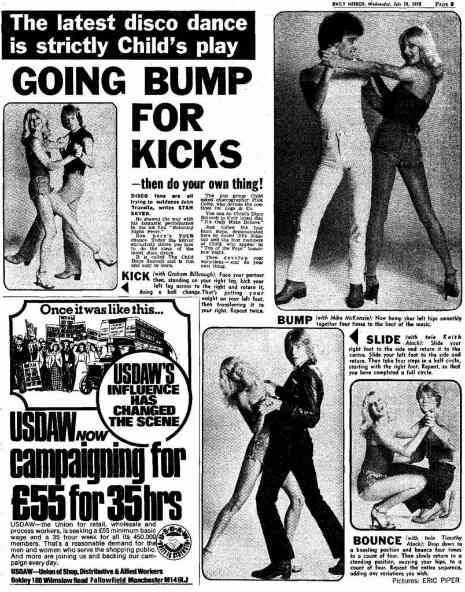
From the Daily Mirror newspaper, 1978 (uploaded by Cornershop15)
This 1978 essay on the cultural meaning of disco by the respected British musicologist Simon Frith (author of Performing Rites: On the Value of Popular Music and Sound Effects: Youth, Leisure and the Politics of Rock ‘n’ Roll) was recently unearthed and re-published by the ever excellent DJHistory.com.
It goes some way towards highlighting the difference in appreciation of the genre on both sides of the Atlantic—it always seemed to me that disco never had the cultural impact in the UK that it had in the States, possibly because of the distinct ethnic and social heritage of the music—while Britain had to wait another ten years to experience its own genuine dance revolution.
What is common on both sides of the Atlantic, and of interest to anyone who likes disco music or lived through these years, was the sneering derision the genre faced from rock listeners and their corresponding press. It took another 20 to 30 years to rehabilitate disco’s reputation, and it’s interesting to read these very criticisms usually levelled by the music media coming from a self-professed disco fan:
In public I’m into punk like everybody else (saviour of rock ‘n’ roll’s soul and all that) but privately I’m a junk rock junkie and the junkiest music of all is disco. Everybody hates it. Hippies hate it, progressives hate it, punks hate it, teds hate it, NME hates it, even Derek Jewell hates it.
Disco is music for the disillusioned. It isn’t art: no auteurs in disco, just calculated dessicating machines. It isn’t folk: no disco subcultures, no disco kids seething with symbolic expression It isn’t even much fun: no jokes, no irony, only a hard rhythmed purposefulness. Disco is the sound of consumption. It exists only in its dancing function: when the music stops all that’s left is a pool of sweat on the floor. And disco’s power is the power of consumption. The critics are right: disco is dehumanising – all those twitching limbs, glazed-eyed, mindless. The disco aesthetic excludes feeling, it offers a glimpse of a harsh sci-fi future. ‘What’s your name, what’s your number?’ sings Andrea True in my current favourite single, and it’s not his telephone number she wants, but his position in the disco order of things. The problem of pogoing, I’ve found, is not that it’s too energetic for anyone over 30 years and 11 stone, but that it requires too much thought.
Popular music has always been dance music; disco is nothing but dance music. It has no rock’n’roll connotations; off the dance floor it is utterly meaningless, lyrically, musically and aesthetically. Every disco sound is subordinate to its physical function; disco progress is technological progress. The end doesn’t change but the means to that end, the ultimate beat, are refined and improved – hence drum machines, synthesisers, 12” pressings. And disco is dance music in the abstract, content determined by form. Popular dance music of the past, in the 1930s say, was a form determined by its content. The content was developed by dance hall instructors and sheet music salesmen and band leaders whose rules of partnership, decorum, uplift and grace, can still be followed in ‘Come Dancing’: the music is strictly subordinate to the conventions of flounce and simper. In contrast, when Boney M, German manufactured black American androgynes, sing for our dancing pleasure, ‘Belfast’, it means nothing at all. Any two syllables arranged and sounding just so would do and how we dance to them is, of course, entirely our own affair. There are no rules in disco, it’s just that individual expression means nothing when there’s nothing individual to express. I trace disco back to the twist, the first dance gimmick to be taken seriously and the first dance step to be without any redeeming social feature. I blame disco on Motown, the first company to realise that if the beat is right, soul power can be expressed without either the passion or emotion that made it soul power in the first place.
You can read the rest of the essay here. In the meantime, here’s something by Andrea True Connection. It’s not “What’s Your Name What’s Your Number?” as mentioned in the essay itself, as I’ve never been a big fan of that track. Instead it’s an earlier gem by the band that predates the awfully similar sounding “Is It Love You’re After” by Rose Royce by a good three years:
Andrea True Connection “Call Me” (1976)





